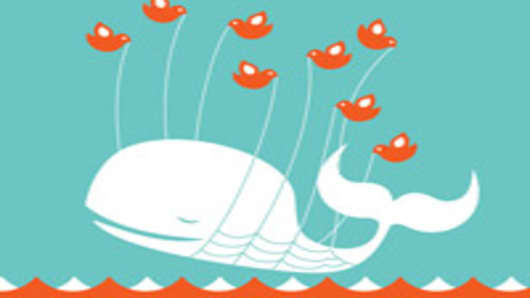Twitter and its 45 million users are certainly no strangers to service outages. I've posted before about the unstable nature of the website and how there were real, legitimate concerns that the site was buckling under the pressure of so many new users so quickly. I mean, with 40 or so employees servicing a 45-million member community that is still dealing with mushrooming growth, there will be some snafus.
Heck, the "Fail Whale" has become one of the net's most recognizable icons.
This morning's nationwide outage was something totally different and it signals a couple of key developments in the Twitter trend.
First, that Twitter is big enough, important enough, critical enough to become a target.
That might seem oxymoronic, but the bigger you are, the bigger the target is on your back. And hackers won't waste time conjuring up an attack unless you're important enough that it will make a splash. And two, and maybe more importantly, the Twitter outages began around 9aEDT, and at least spotty service was back on line three hours later. Depending on the severity of this attack, that's pretty impressive, and speaks volumes about the company's internal mechanisms.
Sure, denial of service attacks suck. But the real problem is how companies react to them. To Twitter's credit, the company updated its status regularly, was working on the issue, kept its users informed, and rather than beat around the bush with some kind of excuse for the downed service, as soon as the DOS was confirmed, the company admitted as much. Crisis management at its finest.
Look, there's very little a company can do when it's the target of one of these attacks. The web's very structure lends itself to making a DOS attack possible. Before you get angry with Twitter about being unable to respond sooner, consider that the company's response time and getting some of its service back up and running in a matter of a few hours was pretty impressive. DOS attacks are kind of the web's version of a roadside bomb. They're easy to mount, crude in nature, and can inflict an enormous amount of damage. And there's very little popular sites can do to defend against them. In other words, you can react to them, but it's very hard to prevent against him.
Randy Abrams, director of technical education at ESET, a web security firm, writes on this post that he doesn't know where the attacks are coming from, "but there may be hell to pay."
So the motives? Perhaps the bad guys are upset that Twitter has recently started filtering URLs in order to cut back on the amount of malware the user’s experience. Twitter’s actions must have hurt the bottom line of some criminal organizations, but there are still other ways thieves can make money and they make none at all if Twitter is down.
"This leads to the thought that either it is a revenge attack by a disgruntled idiot or an attempt to gain fame by a hacker with more technical skills than brains. If it isn’t an organized criminal group that is attacking Twitter I would expect the attacker will draw the ire of criminal groups that abuse Twitter for illegal gains. Somebody is hitting the criminal element in the wallet by attacking Twitter."
Very interesting take.
Which brings me to my final point on this: the Twitter outage six months ago, a year ago, might have been an inconvenience. But today, the site is a phenomenon, a movement, a key form of communication for millions, bad guys and good. No matter: Twitter's responsibility to keep its service up and running has grown exponentially.
Still, with this morning's DOS attack, this has been a rough week for the company: The NFL bans players from using the site; the Marines are banning Twitter; our network this morning spotlighted law firms that are warning attorneys not to use the site. Which only brings to the fore how far into the mainstream the site has traveled.
On CNBC.com
Slideshow: 10 Biggest Tech Blunders in the Last 25 Years
I have written extensively that I think the media coverage of Twitter is way, way, way overblown. And the same thing could be said of Facebook. Neither banks any measurable profits, which from a financial media standpoint should be priority-one in our interest. But from a mainstream, lifestyle point of view, Twitter has a responsibility to its users first, and the financial spoils may come later. In the meantime, Twitter did it right this morning and took some big steps forward in improving its image.
Now, if only it could actually make some cash to put some meat on the bone, and make this story truly interesting.
Questions? Comments? TechCheck@cnbc.com


